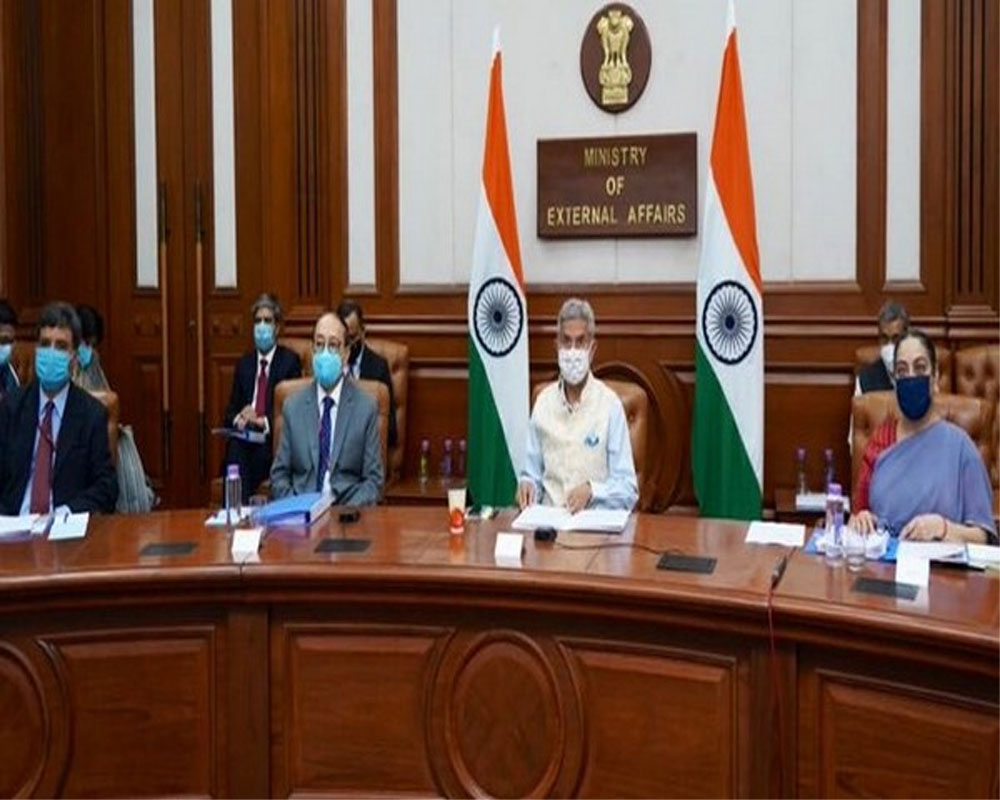The SAARC must overcome three key challenges of cross-border terrorism, blocking of connectivity and obstruction in trade, External Affairs Minister S Jaishankar said on Thursday in a clear criticism of Pakistan at a virtual meeting of the regional grouping.
In his address at the SAARC foreign ministers informal meeting, Jaishankar also called for a collectively resolve to defeat the scourge of terrorism, including the forces that nurture, support and encourage it.
Jaishankar reaffirmed India's commitment to its 'Neighbourhood First' policy and towards building a connected, integrated and prosperous South Asia.
Pakistan Foreign Minister Shah Mahmood Qureshi was among the participants of the meeting which was organised in continuation of a tradition of informal exchanges among the foreign ministers of the grouping on the sidelines of the UN General Assembly.
The 75th session of the UN General Assembly is currently underway.
The external affairs minister said SAARC has made significant progress over the last 35 years but the efforts towards collective collaboration and prosperity have been hampered by acts of terrorism and threats to national security.
"Such an environment impedes our shared objective of realising the full potential of our collective endeavour. It is therefore crucial that we collectively resolve to defeat the scourge of terrorism, including the forces that nurture, support and encourage it," he was quoted as saying by MEA Spokesperson Anurag Srivastava in a series of tweets.
Jaishankar said such an approach will generate the much-needed trust and confidence to collectively build a stronger and prosperous SAARC.
Besides India and Pakistan, the grouping comprises Afghanistan, Bangladesh, Bhutan, Maldives, Nepal and Sri Lanka. "Addressed the #SAARC Foreign Ministers Informal Meeting today. Reaffirmed India's commitment to Neighbourhood First policy and towards building a connected, integrated, secure and prosperous South Asia," Jaishankar tweeted.
"Cross-border terrorism, blocking connectivity and obstructing trade are three key challenges that SAARC must overcome. Only then will we see enduring peace, prosperity and security in our South Asia region," he added.
Pakistan had blocked a key connectivity initiative under SAARC framework six years back besides obstructing trade among the member nations.
SAARC has not been very effective since 2016 as its bienniall summits have not taken place since the last one in Kathmandu in 2014.
The 2016 SAARC Summit was to be held in Islamabad. But after the terrorist attack on an Indian Army camp in Uri in Jammu and Kashmir on September 18 that year, India expressed its inability to participate in the summit due to "prevailing circumstances".
The summit was called off after Bangladesh, Bhutan and Afghanistan also declined to participate in the Islamabad meet.
The external affairs minister also participated in the 'special ministerial meeting' of foreign ministers of the Conference on Interaction and Confidence Building Measures in Asia (CICA).
The CICA is an inter-governmental forum to boost cooperation towards promoting peace, security and stability in Asia. It has 27 countries as its members.
"Underlined India's commitment to a pluralistic cooperative security order in Asia through CICA. This is needed more than ever before," Jaishankar tweeted.
In the virtual meeting, Jaishankar also called for greater collective efforts to counter terrorism and its sponsors.
"Reaffirmed India's support for Afghan peace process that respects its national sovereignty & territorial integrity and preserves its democratic progress," he added.


























